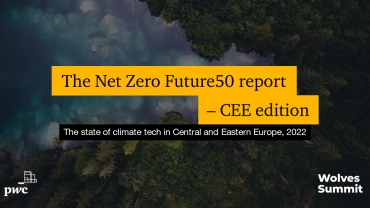
CEE Webcast
Following the launch of the 26th Annual Global CEO Survey, on 17 March we held a CEE Webcast: Transforming for impact on the future of Central and Eastern Europe to present and discuss the results for our region. The event was hosted by PwC CEE CEO Adam Krasoń and moderated by Kasia Madera, BBC News host and presenter.
We were joined by regional business leaders. Many thanks to our panelists:
Michelle Simmons, General Manager CEE Multi-Country, Microsoft,
Tomasz Wiatrak, Chairman & CEO, ORLEN Unipetrol,
- Krzysztof Krawczyk, Partner, Head of Poland at CVC Capital Partners.
Missed the event? Watch the recording above.
26th Annual CEO Survey – Central and Eastern Europe
The war in Ukraine has put the global spotlight on Central and Eastern Europe. From Germany’s eastern border to the frontier of China, CEOs throughout the region are dealing with the fallout from the conflict, which is also driving uncertainty around the world. CEE executives must seize this opportunity to transform their organisations, meeting challenges including geopolitical threats, rampant inflation and economic instability.
Like their peers elsewhere, CEOs in this region are pessimistic about the prospects for the global economy, PwC’s 26th Annual CEO Survey finds. Similarly, they’re bearish on the outlook for their own national economies. The good news? Executives are more optimistic about their companies’ own prospects. They see the need for change – and they’re also thinking about the steps they need to get there.
This is an optimistic sign that executives are finding ways to leverage the current crisis for their companies’ long-term benefit. As leaders seek to transform their organisations, we believe the data in this survey can be a powerful tool for them, highlighting priority areas for change and helping them chart a course of action.
CEOs are justifiably pessimistic about global economic growth in the year ahead
The biggest near-term challenge facing CEOs in Central and Eastern Europe is the state of the global and regional economy. Nearly three-quarters of CEOs in the region, and 73% globally, project that global economic growth will slow over the next 12 months. These expectations represent a sharp reversal from last year, when 68% in the region and 77% around the world foresaw an improvement. Last year’s optimism, driven by the waning of the global pandemic, was dashed in 2022 by shocks such as Russia’s invasion of Ukraine, surging energy and commodity prices, and accelerating general wage and price inflation.
Question: How do you believe economic growth (i.e., gross domestic product) will change, if at all, over the next 12 months in the global economy?

Question: How do you believe economic growth (i.e., gross domestic product) will change, if at all, over the next 12 months in your country / territory?

CEE executives are slightly less pessimistic about their own country or territory's economy: 65% believe growth will slow. This is so even though their economies have been more directly affected by Russia's invasion of Ukraine, due to their higher dependency on Russian gas and the influx of millions of refugees.
Russia's invasion of Ukraine has added additional geopolitical risks to the numerous existing threats to business. I am convinced, while at the same time hoping for a major de-escalation of the conflict of course, that our region will become even stronger thanks to growing exports and will also become an important centre of the nearshoring phenomenon worldwide. I also know that if organisations are to remain viable in the near and long-term, they must invest in their people and technological transformation agendas to empower their workforces. Leaders need to empower and engage their people like never before if they are to withstand the pressures of today’s economic environment and long-term disruptors.
CEOs in our region are more confident in their own company’s growth
Despite their gloom about macro conditions, CEOs are quite confident when it comes to things they can directly control: they are more bullish than the global average on their own company’s revenue growth prospects over the next 12 months, with 46% saying they’re “extremely confident” versus 42% globally. Their optimism is even greater when looking at a three-year horizon, with 50% in CEE and 53% globally saying they’re confident in their company's growth.
Question: How confident are you about your company’s prospects for revenue growth over the next 12 months?

Question: How confident are you about your company’s prospects for revenue growth over the next 3 years?

When it comes to seeking expansion opportunities abroad, not surprisingly CEE leaders are looking closer to home than before. The shock of the pandemic and the ongoing geopolitical turmoil mean companies around the world are seeking ways to nearshore their business relationships, shortening and strengthening supply chains, and companies in our region are no different.
In this year’s survey, Germany remains the top focus for growth for CEE CEOs. Within the region, business leaders indicated an increased focus on Ukraine (8%), Serbia (6%), Hungary (5%), the Czech Republic (5%), Albania (5%) and Bosnia and Herzegovina (4%) – again reflecting the nearshoring trend.
The geographical priorities of executives in our region also reflect the continued effect of Brexit on companies in EU member states. Italy and France are now in a tie for fourth place, identified as a priority by 9% of executives, and the UK has slipped to seventh place, with 7%.
Question: Which three countries/territories, excluding the country/territory in which you are based, do you consider most important for your company’s prospects for revenue growth over the next 12 months?


Key threats: Inflation is the top concern in the next 12 months, with geopolitical conflict the biggest worry over the next five years
The threat perception among CEOs in CEE is aligned with that of their global counterparts. While the danger from the war, captured in the category of geopolitical conflict, is certainly real, it is overshadowed by the threat from inflation; macroeconomic volatility rounds out the top three. All of these are immediate issues that can reinforce and compound each other, for example, as the war in Ukraine pushes up prices, this encourages central banks worldwide to intervene through growth-damping interest rate hikes.
Still, executives perceive inflation as a relatively transitory threat: While 55% say their companies are “extremely exposed” to it over the next 12 months, the figure for the next five years declines to 36%. Geopolitical risk, meanwhile, moves down by just 6 percentage points to 37%, the highest ranking over the five-year horizon.
In comparison to last year's CEO Survey findings, cyber risks and climate change have slipped down the list of regional and global business leaders’ threat priorities. CEE leaders are also much more aligned here with their peers around the world.
Question: How exposed do you believe your company will be to the following threats in the next 12 months?

CEE:

Taking action: In CEE, CEOs are raising prices and cutting costs—but most don’t plan to reduce workforce
In response to near-term economic challenges, CEOs in the region are in line with global peers in taking actions to spur revenue growth and cut costs. One action stands out: 58% of CEOs in our region say they’ve already begun implementing price increases – a tool that so far just 51% of their global peers have reached for. This is understandable when we look at the region’s rates of price growth compared to Western Europe. According to the Eurostat data published in December 2022, the lowest annual rates were registered in Spain (6.7%), France (7.1%) and Malta (7.2%). And the highest rates were recorded in Hungary (23.1%), Latvia (21.7%), Estonia and Lithuania (both 21.4%). More executives in CEE feel they simply have to begin to pass on their increased costs to their customers.
Both in CEE and globally, the shock of the Great Resignation and the ongoing need to attract and retain talent are shaping the response to macroeconomic challenges. Although 51% of leaders say they have already begun cutting operational costs and 21% have slowed investments, just 18% are implementing hiring freezes, only 12% are reducing the size of their workforce and 9% are reducing compensation.
Question: What actions, if any, is your company considering to mitigate against potential economic challenges and volatility in the next 12 months?

“CEOs in our region have a huge role to play, alongside policymakers and other leaders, in responding to the geopolitical challenges from the war in Ukraine. Their decisions today will shape the future for decades to come, so it is encouraging to see their heightened engagement and determination to seize opportunities for transformation in response to the crisis. That determination also extends to areas beyond geopolitics, such as inflation, energy and climate change. In recent years we’ve noted a ‘wait and see approach’, where regional executives are more hesitant than their global peers to push for sweeping change. Today, CEOs in CEE share a growing conviction that the time to act is now.”
Urgent need for transformation: 45% of CEOs in CEE think their companies won’t be economically viable a decade from now if they continue as is
Global and CEE CEOs have a keen awareness of the potential for disruption ahead: 45% in our region, and nearly 40% globally, don’t think their companies will be economically viable a decade from now if they continue on their current path. Business leaders are conscious that the threats they face are existential – and they’re taking action accordingly.
Question: If your company continues running on its current path, for how long do you think your business will be economically viable?


CEE’s continuing war for talent: Labour and skills shortages seen as top long-term challenge to profitability
Chief among threats to their businesses, for leaders in our region, are potential shortages of labour and skills – part of the ongoing global war for talent that has been evident in CEO surveys for several years now. When asked about the forces most likely to impact their industry’s profitability over the next 10 years, as many as 64% of regional CEOs cited skills shortages as impacting them “to a large/very large extent”, well above the 52% global rate.
Other threats include changing customer preferences (CEE: 52%, global: 56%), and technology disruption, e.g. advanced tech, AI, the metaverse, blockchain (CEE: 47%, global: 49%).
Question: To what extent do you believe the following will impact (i.e., either increase or decrease) profitability in your industry over the next ten years?

To respond effectively to these challenges, CEOs are building resilience today. Technology- and reinvention-oriented investments loom large for many global and CEE CEOs. In our region, business leaders are planning to invest more in automation, deploy technologies (cloud, AI, etc.), and upskill their workforce in the next 12 months.
Question: Which of the following investments, if any, is your company making in the next 12 months?

CEOs in our region may need to further increase cyber investments in response to geopolitical conflict
The digital transformation of the global economy has changed cybersecurity. The COVID-19 pandemic forced many companies to shift to remote work and online sales, which propelled the adoption of new tools and technologies. As a result, digital transformation shifted from a long-term agenda item to the most urgent one. Yet leaders have to bear in mind that it’s easy for important business technology investments to inadvertently create cyber vulnerabilities.
While the survey shows that cyber risks are not a top priority for chief executives in the next 12 months, the picture changes for their five-year outlook. Over that timeframe, cyber risks join inflation, macroeconomic volatility, and geopolitical conflict in the top tier of risk exposure. This suggests that there is a clear first-mover advantage for leaders who are able to prioritise investments in cybersecurity today, stealing a march on their competitors.
Question: What actions, if any, is your company considering to mitigate against exposure to geopolitical conflict in the next 12 months?

Please note: Only asked to those respondents who said stated that they were at least "Slightly exposed" to geopolitical conflict in the next 12 months at Q3.

Managing climate risks is a growing priority for businesses – both globally and in CEE
CEOs both in our region and globally expect some degree of impact from climate change in the next 12 months—primarily in their cost profiles, where 46% expect a moderate, large, or very large impact, followed by supply chains (43%). Fewer are worried about climate-related damage to their physical assets (17%).
Question: To what extent do you expect the following areas of your business to be impacted by climate risk in the next 12 months?

Moving at the right pace and with the right priorities to mitigate climate risks, generate opportunities and decarbonise is an enormous strategic challenge. Many companies appear to be strategising today without the information provided by an internal pricing mechanism for carbon, even though this could help them account for considerations such as taxes and incentives, and clarify strategic tradeoffs. The question then is whether leaders in our region are correct in moving more slowly than their global peers to address climate challenges.
Question: Below is a list of actions companies may undertake to prepare for the risk of climate change. Which statement best characterises your company’s level of progress on these actions?

Energy independence is a growing priority for leaders in our region
Russia’s invasion of Ukraine was a wake-up call for many CEE countries, which were heavily dependent on Russian gas. In this year’s survey, 48% of CEOs in CEE said that the transition to new energy sources will impact their business in the next 10 years, substantially more than the 37% of global leaders who foresee this effect. And 46% of business leaders in CEE (globally: 34%) plan to invest in alternative new energy sources in the next 12 months. This is an encouraging sign which will also beef up companies’ ability to respond to climate-related challenges.
CEOs want to spend less time on operations, more time reinventing their business
We asked CEOs how they divide their time among a range of priorities, including driving current operating performance; adapting the business for the future; spending time with customers; engaging with employees; and interacting with investors, the board, and other external stakeholders. Driving current operating performance consumed the biggest share of CEOs’ time. If they could redesign their schedules, they told us, they would spend more time evolving the business and its strategy to meet future demands.
The results indicate how the challenges of today’s business environment demand that CEOs keep their hands firmly on the wheel, giving them less time for less immediate considerations. This highlights how business transformation is important not only for companies to survive after the next 10 years, but also for reimagining the role of the CEO: creating organisations whose top leaders are freed up from day-to-day challenges.
Question: During your work time, on average, what percentage of time do you spend on each of the following?

Question: Knowing what you know now, if you could start over with a blank calendar, how would you allocate your time as CEO?

CEOs need to empower their people to deliver on today’s business – to free up time to focus on the future
Engaged, empowered organisations move faster, innovate more readily, and collaborate more effectively to get things done. For CEOs hoping to enjoy such benefits, this year’s survey suggests some warning signs, as well as areas of opportunity. As many as 43% of CEE CEOs said leaders in their organisation do not often encourage debate and dissent, while 57% said their leaders did not often tolerate small-scale failures. And 75% said their leaders do not often make independent strategic decisions for their function or division.
Question: For each of the statements below, please indicate how frequently these occur in your company:

The diversity and complexity of today’s business challenges place a premium on the ability to collaborate across the boundaries of the corporation. To get a window on these dynamics, we asked CEOs how they forge partnerships—with whom and to what objective. The results show that companies work with a wide network of collaborators, and that those relationships are most often struck to create new sources of value. Addressing societal issues such as education and sustainable development was more often a goal of collaboration with non-business entities like NGOs.
Question: To what extent is your company collaborating with the following groups to:
a) Create new sources of value?

b) Address societal issues?

Looking ahead: Redefining the leadership agenda for CEE
This is our 26th year of engaging business leaders around the world on their confidence level, their main priorities and the actions they are taking for the year ahead. Never has this exercise been more crucial to the future of our region. We believe that the leadership agenda of CEOs will go a long way towards mapping a path for the region overall.
Decades-high inflation, supply chain disruption, and geopolitical conflict have contributed to a level of CEO pessimism not seen in over a decade. But there is an opportunity in every crisis. And the need to take decisive action by the leaders and to reinvent their businesses for the future has never been as strong – 45% in our region don’t think their companies will be economically viable a decade from now if they continue on their current path.
The data we presented show that CEOs are balancing how to maintain focus on both long-term and short-term challenges.
They might be now focused more on current concerns: inflation, geopolitical turmoil and the economic downturn. But looking after employees and upskilling them is an even more pressing need than ever before. Labour and skills shortages are seen as top long-term challenges to profitability in the CEE region.
CEOs here and around the world also noted the need to collaborate with a wide range of stakeholders to build trust and deliver sustained outcomes if they are to generate long-term societal value.
The decisions that CEOs make in these moments will shape the development of their organisations, and of the region’s economies and society as a whole for the next decade or more. We are hopeful that our research will help leaders identify vulnerabilities and focus on their biggest opportunities, leading to broad, long-lasting positive change. We look forward to continuing to engage with our clients and stakeholders in the months ahead on this important discussion about the future of our region.
Methodology
PwC surveyed 4,410 CEOs in 105 countries and territories in October and November of 2022. The global and regional figures in this report are weighted proportionally to country or regional nominal GDP to ensure that CEOs’ views are representative across all major regions. The industry- and country-level figures are based on unweighted data from the full sample of 4,410 CEOs. There were 99 CEOs from Central and Eastern Europe included in the sub-sample.
Contact us


Agnieszka Gajewska
Global Government & Public Services Leader, CEE Clients & Markets Leader, PwC Central and Eastern Europe
Tel: +48 517 140 537

Jeffery McMillan
CEE Director of Brand, Marketing & Communications, PwC Central and Eastern Europe
Tel: +48 519 506 633




